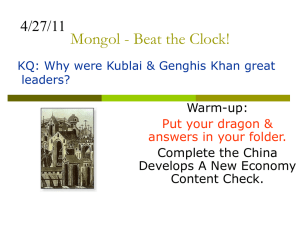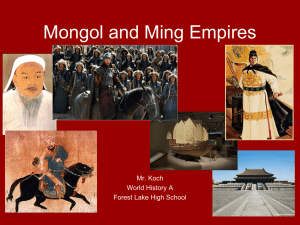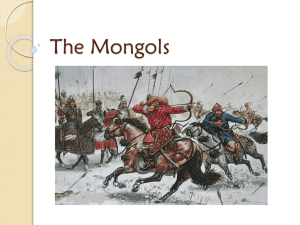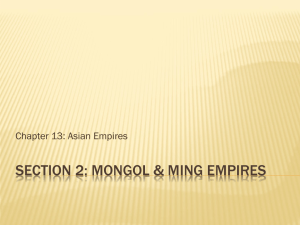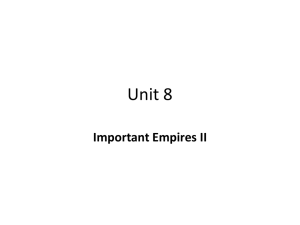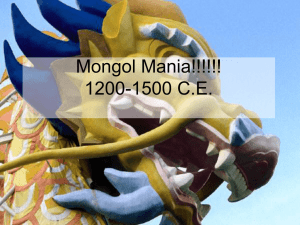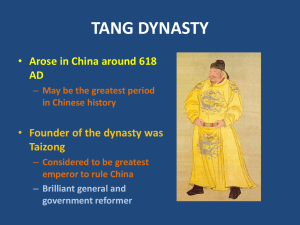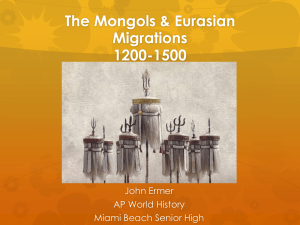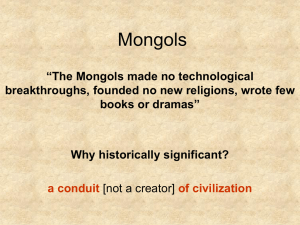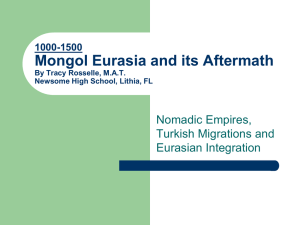Genghis Khan1 - Marshall Middle School
advertisement
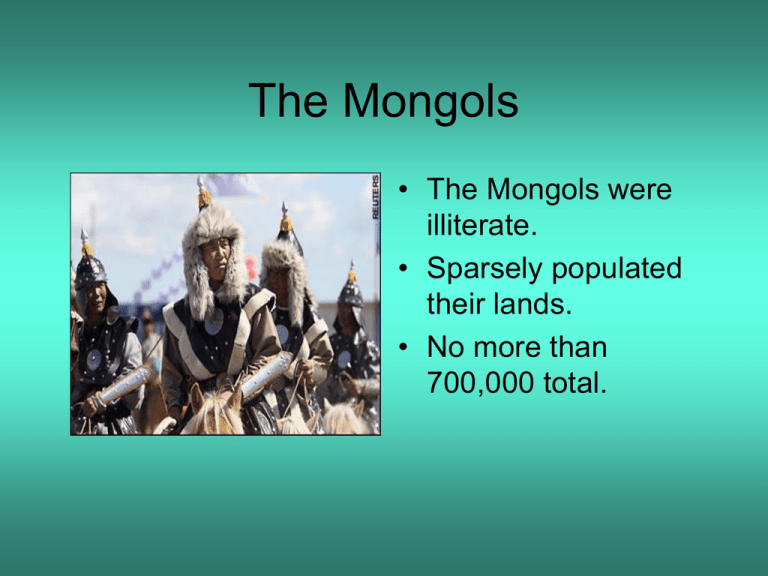
The Mongols • The Mongols were illiterate. • Sparsely populated their lands. • No more than 700,000 total. The Mongols • They were originally herdsmen on the grassy plains north of the Gobi Desert. • Before the year 1200, they were fragmented. The Mongols • Moving about in small bands headed by a chief, or Khan. • Living in portable dwellings, like tipis The Mongols • They frequently fought over turf. • During hard times they occasionally raided. The Mongols • The Mongols endured frequent hard times. • Finding few areas for grazing their animals. The Mongols • Interested in goods rather than bloodshed. • They did not collect heads or scalps as trophies. • They did not notch wood to record their kills. The Mongols • In 1206, a leader named Temujin took the title Universal Ruler. • Which translates to Genghis Khan. Genghis Khan Like peoples everywhere… • The Mongols saw themselves at the center of the universe. • The greatest of people and favored by the gods. Genghis Khan • They justified Khan's success in warfare. • Claiming that he was the rightful master of the entire world. • Genghis Khan continued organizing. Genghis Khan • He improved his military organization. • This served as a mobile political bureaucracy. Genghis Khan • He broke up what was left of old enemy tribes. • Leaving only those tribes that had proved their loyalty to him. Genghis Khan • He created a body of law that he was to work on throughout his life. Genghis Khan • He made the kidnapping of women a crime. • He declared all children legitimate, whomever the mother. Genghis Khan • He made it law that no woman would be sold into marriage. • The stealing of animals was made a capital offense. • A lost animal was to be returned to its owner. Genghis Khan Qu i c k T i m e ™ a n d a T I F F (Un c o m p re s s e d ) d e c o m p re s s o r a re n e e d e d t o s e e t h i s p i c tu re . • Taking lost property as one's own was to be considered thievery and a capital offense. • He regulated hunting, improving the availability of meat for everyone. Genghis Khan • He introduced written record keeping. • He had his native language put into writing. Genghis Khan • He created official seals. • He created a supreme officer of the law. Genghis Khan – To oversee the trials of all those charged with wrongdoing – To have the power to issue death sentences. Genghis Khan • He created order in his realm. • This strengthened it and his ability to expand. Genghis Khan • He acted on his mandate as the rightful ruler of the entire world. • Attacked the rulers of farmers and herders in northwestern China. Genghis Khan • The Mongols benefited from China’s military weakness. • The Mongols used divide and conquer tactics. • Being kind toward those who sided with them… • And terror and bloodshed against those who did not. Genghis Khan • They ravaged the countryside. • Driving populations in front of them. Genghis Khan • They used conscripted labor in attacking cities • And in operating their newly acquired Chinese siege engines. Genghis Khan • Genghis Khan and his army overran Beijing. • Pushed into the heartland of northern China. Genghis Khan • Military success helped people believe that Genghis Khan had the Mandate of Heaven. • That fighting against him was fighting heaven itself. Genghis Khan • The Chinese emperor recognized Mongol authority and agreed to pay tribute. Genghis Khan • After six years of fighting,Khan returned to Mongolia. • Leaving one of his best generals in charge of Mongol positions. Genghis Khan • Returning with Genghis Khan were engineers • They had become a permanent part of their army. • There were captive musicians. • Translators, doctors and scribes. Genghis Khan • Camels and wagonloads of goods. • Among the goods were silk, including silken rope. • Cushions, blankets, robes, rugs. • Wall hangings, porcelain, iron kettles. Genghis Khan • Armor, perfumes, jewelry, wine, honey. Genghis Khan • Medicines, bronze, silver and gold, and much else. Genghis Khan • Goods from China would now come in a steady flow.
